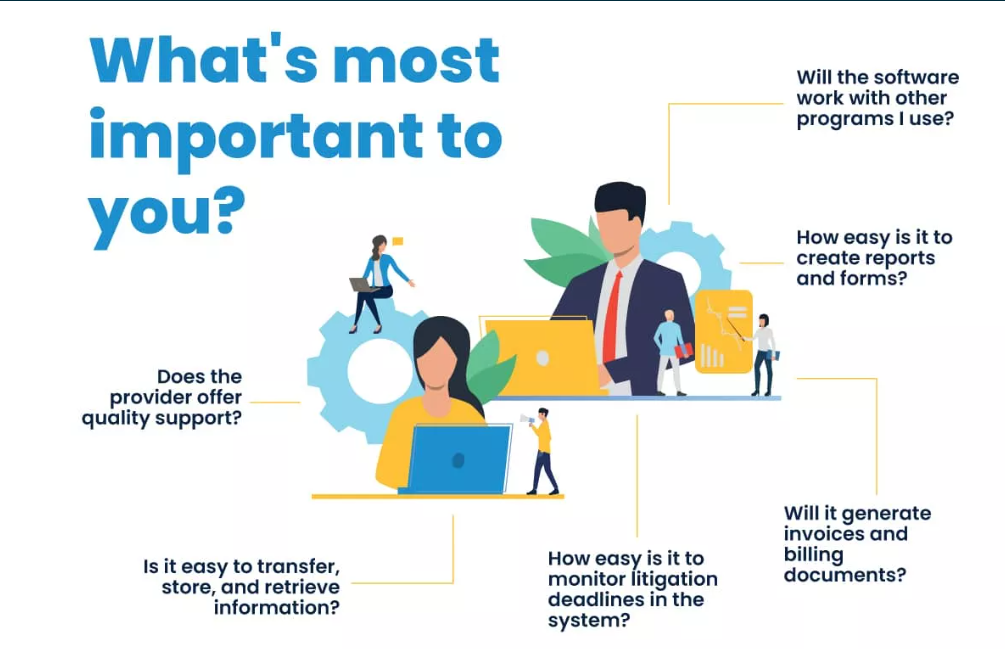In today’s fast-paced digital world, where efficiency and organization are paramount, legal case management systems have emerged as invaluable tools for law firms, courts, and legal professionals. These systems offer a comprehensive and streamlined approach to managing legal cases, enhancing productivity, and improving overall efficiency. In this blog post, we will delve into the benefits of legal case management systems and their potential for revolutionizing the legal process. Furthermore, we will explore the risks associated with implementing such systems in the federal government of the United States and propose strategies to mitigate these risks.
Streamlining the Legal Process
Legal case management systems serve as digital hubs for managing the entire lifecycle of legal cases. From client intake and document management to calendaring, task assignment, and communication, these systems centralize all case-related information, ensuring efficient and accessible workflows. Here are some key advantages of implementing legal case management systems:
- Enhanced Organization: By digitizing and automating various processes, case management systems eliminate the need for manual paperwork, resulting in a more organized and streamlined approach. Case files, documents, and other critical information are securely stored and easily retrievable, saving time and reducing the risk of errors.
- Improved Collaboration: Legal case management systems facilitate seamless collaboration among legal professionals by enabling real-time document sharing, task assignment, and communication. This enhances teamwork, encourages knowledge sharing, and ensures everyone involved in a case is on the same page.
- Efficient Time and Task Management: These systems enable automated scheduling and task assignment, ensuring deadlines are met, and important dates are not overlooked. Legal professionals can prioritize their work effectively, track progress, and stay informed about upcoming court dates, meetings, and appointments
- Streamlined Communication: With integrated communication features like email integration and secure messaging, legal case management systems promote efficient communication both internally within the legal team and externally with clients and other stakeholders. This ensures timely and transparent communication, reducing the chances of miscommunication and improving client satisfaction.

Risks in Implementing Legal Case Management Systems in the Federal Government
While legal case management systems offer numerous benefits, implementing them in the federal government of the United States presents specific challenges and risks. These risks include:
- Security and Privacy Concerns: Government agencies deal with sensitive and confidential information, making data security and privacy crucial. Implementing a case management system requires ensuring robust security measures to protect sensitive data from unauthorized access or breaches.
- Compliance with Regulations: The federal government operates within a complex regulatory environment. Implementing a legal case management system necessitates compliance with various regulations such as the Federal Information Security Management Act (FISMA), the Privacy Act, and other relevant standards. Failure to adhere to these regulations can lead to legal and reputational consequences.
- Interoperability and Integration Challenges: The federal government comprises multiple agencies and departments, each with its own systems and databases. Integrating a case management system across these disparate systems poses significant technical challenges and requires careful planning and coordination.
- User Adoption and Training: Introducing a new case management system requires adequate user adoption and training. Resistance to change, lack of proper training, and unfamiliarity with the system can hinder its successful implementation and utilization.

Avoiding Risks and Ensuring Successful Implementation
To mitigate the risks associated with implementing a legal case management system in the federal government, the following strategies should be considered:
- Thorough Vendor Evaluation: Prioritize vendors with a proven track record in serving government entities and ensure their system meets the required security and compliance standards. Thoroughly review their security measures, data encryption protocols, and data backup procedures.
- Robust Security Measures: Implement strong security controls such as multi-factor authentication, access controls, data encryption, and regular security audits. Work closely with the IT department and security experts to identify and address potential vulnerabilities.
- Compliance and Regulation Adherence: Ensure the case management system complies with relevant regulations and standards. Collaborate with legal and compliance teams to review contractual agreements and make necessary adjustments to align with government requirements.
- Seamless Integration and Interoperability: Engage IT experts to evaluate the existing infrastructure and develop a plan for seamless integration of the case management system. This may involve data migration, system integration, and establishing standardized protocols for information exchange.
- Comprehensive User Training: Provide thorough training and user support to ensure smooth adoption and utilization of the system. Conduct training sessions, create user manuals, and offer ongoing assistance to address any queries or challenges that may arise.
Conclusion
Legal case management systems have the potential to revolutionize the legal process by streamlining workflows, enhancing collaboration, and improving overall efficiency. While implementing these systems in the United States federal government poses certain risks, careful evaluation, robust security measures, compliance adherence, seamless integration, and comprehensive user training can help mitigate these risks. By embracing technological advancements and leveraging legal case management systems effectively, the federal government can enhance its operational efficiency and provide better legal services to citizens.
InfoSmart Technologies Inc. has collaborated with law firms, legal departments, and various
government customers on multiple projects. Get in touch with InfoSmart Technology Inc. to hire or enquire about our comprehensive and reliable Legal case management systems in USA.

